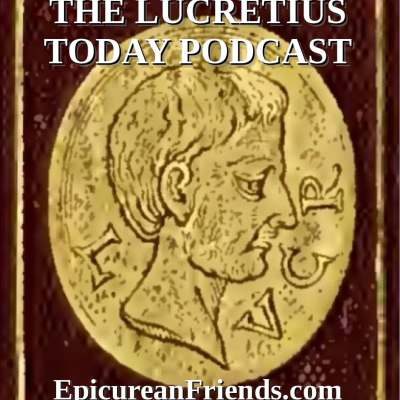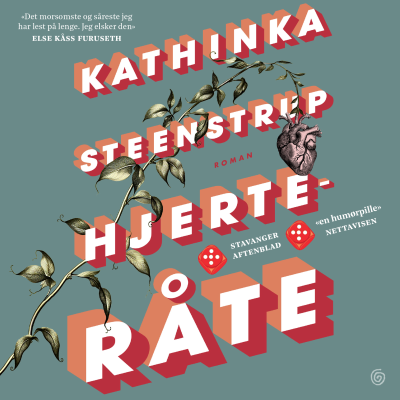
Lucretius Today - Epicurus and Epicurean Philosophy
engelsk
Historie & religion
Prøv gratis i 14 dager
99 kr / Måned etter prøveperioden.Avslutt når som helst.
- 20 timer lydbøker i måneden
- Eksklusive podkaster
- Gratis podkaster
Les mer Lucretius Today - Epicurus and Epicurean Philosophy
Lucretius Today is a podcast dedicated to learning Epicurean philosophy through study of the poet Lucretius, who lived in the age of Julius Caesar and wrote "On The Nature of Things," the only complete presentation of Epicurus' ideas left to us from the ancient world. We'll walk you line by line through the six books of Lucretius' poem, and we'll discuss how Epicurean philosophy can apply to you today. In this podcast we won't be talking about modern political issues. How you apply Epicurus in your own life is entirely up to you. Over at the Epicureanfriends.com web forum, we apply this approach by following a set of ground rules we call "Not Neo-Epicurean, But Epicurean." Epicurean philosophy is not a religion, it''s not Stoicism, it's not Humanism, it's not Libertarianism, it's not Atheism, and it's not Marxism or any other philosophy - it is unique in the history of Western Civilization, and as we explore Lucretius's poem you'll quickly see how that is the case. The home page of this podcast is LucretiusToday.com, and there you can find a free copy of the version of the poem from which we are reading, and links to where you can discuss the poem between episodes at Epicureanfriends.com.
Alle episoder
321 EpisoderEpisode 321 - The Epicurean Criticism of Socrates For Denouncing Natural Science
Welcome to Episode 321 of Lucretius Today. This is a podcast dedicated to the poet Lucretius, who wrote "On The Nature of Things," the most complete presentation of Epicurean philosophy left to us from the ancient world. Each week we walk you through the Epicurean texts, and we discuss how Epicurean philosophy can apply to you today. If you find the Epicurean worldview attractive, we invite you to join us in the study of Epicurus at EpicureanFriends.com, where we discuss this and all of our podcast episodes. This week we start are continuing our series reviewing Cicero's "Academic Questions" from an Epicurean perspective. We are focusing first on what is referred to as Book One, which provides an overview of the issues that split Plato's Academy and gives us an overview of the philosophical issues being dealt with at the time of Epicurus. This week will will continue in Section 2 [https://epicurustoday.com/02-keysources/045-cicero-academic-questions-yonge/#ii] and our focus will include a statement by Varro in praise of Socrates, and possible Epicurean responses to it. https://www.epicureanfriends.com/thread/4941-episode-321-the-epicurean-problems-with-socrates-not-yet-released/?postID=38748#post38748
Episode 320 - Are the Good of A Sheep And Of A Man The Same?
Welcome to Episode 320 of Lucretius Today. This is a podcast dedicated to the poet Lucretius, who wrote "On The Nature of Things," the most complete presentation of Epicurean philosophy left to us from the ancient world. Each week we walk you through the Epicurean texts, and we discuss how Epicurean philosophy can apply to you today. If you find the Epicurean worldview attractive, we invite you to join us in the study of Epicurus at EpicureanFriends.com, where we discuss this and all of our podcast episodes. This week we start are continuing our series reviewing Cicero's "Academic Questions" from an Epicurean perspective. We are focusing first on what is referred to as Book One, which provides an overview of the issues that split Plato's Academy and gives us an overview of the philosophical issues being dealt with at the time of Epicurus. https://www.epicureanfriends.com/thread/4939-episode-320-eateq-02-are-the-good-of-a-sheep-and-the-good-of-a-man-the-same-not/
Episode 319 - Is the Key To Happiness Found In Supernatural Causes and Geometry?
Welcome to Episode 319 of Lucretius Today. This is a podcast dedicated to the poet Lucretius, who wrote "On The Nature of Things," the most complete presentation of Epicurean philosophy left to us from the ancient world. Each week we walk you through the Epicurean texts, and we discuss how Epicurean philosophy can apply to you today. If you find the Epicurean worldview attractive, we invite you to join us in the study of Epicurus at EpicureanFriends.com, where we discuss this and all of our podcast episodes. Last week we completed our series on Cicero's "Tusculan Disputations," and this week we start a new series that will help us with canonics / epistemology. We will eventually move to Philodemus' "On Signs" / "On Methods of Inference," and when we do we will refer to David Sedley's article on "On Signs," and the appendix in the translation prepared by Philip Lacey, both of which are very good but difficult. To get us acclimated to the issues, we need a little more Cicero from his work "Academic Questions." This is much shorter than On Ends and Tusculan Disputations but gives us an overview of the issues that split Plato's Academy and shows how Aristotle and the Stoics (and Epicurus) responded to those controversies. https://www.epicureanfriends.com/thread/4922-episode-319-is-the-secret-to-happiness-found-in-supernatural-causes-and-geometry/
Episode 318 - In The End It Is Pleasure - Not Virtue - That Gives Meaning To A Happy Life
Welcome to Episode 318 of Lucretius Today. This is a podcast dedicated to the poet Lucretius, who wrote "On The Nature of Things," the most complete presentation of Epicurean philosophy left to us from the ancient world. Each week we walk you through the Epicurean texts, and we discuss how Epicurean philosophy can apply to you today. If you find the Epicurean worldview attractive, we invite you to join us in the study of Epicurus at EpicureanFriends.com, where we discuss this and all of our podcast episodes. We are closing in on the end of those portions of Tusculan Disputations that are most relevant to Epicurean philosophy today, so we'll pick up this week with [Section 34 of Part 5](https://epicurustoday.com/02-keysources/044-cicero-tusculan-disputations-yonge/#xxxiv-2). Cicero spends the final sections trying to chip away at pleasure being the goal of life by discussing how luxury, honor, and riches are not required for happiness. He does so generically without direct mention of Epicurus, but we'll discuss his examples and how his argument actually proves Epicurus' point that pleasure is the goal: those who overindulge obtain do not _in sum_ obtain pleasure, but in fact more pain than pleasure. https://www.epicureanfriends.com/thread/4921-episode-318-td44-completing-tusculan-disputations-not-yet-released/
Episode 317 - The Epicurean System of Counterbalancing In Pursuit of Pleasure
Welcome to Episode 317 of Lucretius Today. This is a podcast dedicated to the poet Lucretius, who wrote "On The Nature of Things," the most complete presentation of Epicurean philosophy left to us from the ancient world. Each week we walk you through the Epicurean texts, and we discuss how Epicurean philosophy can apply to you today. If you find the Epicurean worldview attractive, we invite you to join us in the study of Epicurus at EpicureanFriends.com, where we discuss this and all of our podcast episodes. We are closing in on the end of those portions of Tusculan Disputations that are most relevant to Epicurean philosophy today, so we'll pick up this week with more on [Section 32 of Part 5](https://epicurustoday.com/02-keysources/044-cicero-tusculan-disputations-yonge/#xxx-2). https://www.epicureanfriends.com/thread/4906-episode-317-td43-the-epicurean-system-of-counterbalancing-in-pursuit-of-pleasure/
Velg abonnementet ditt
Premium
20 timer lydbøker
Eksklusive podkaster
Gratis podkaster
Avslutt når som helst
Prøv gratis i 14 dager
Deretter 99 kr / måned
Premium Plus
100 timer lydbøker
Eksklusive podkaster
Gratis podkaster
Avslutt når som helst
Prøv gratis i 14 dager
Deretter 169 kr / måned
Prøv gratis i 14 dager. 99 kr / Måned etter prøveperioden. Avslutt når som helst.















































